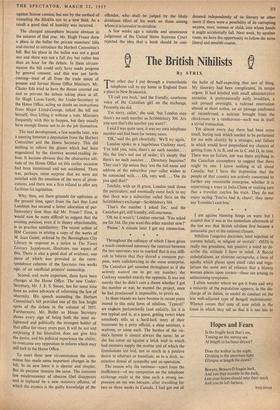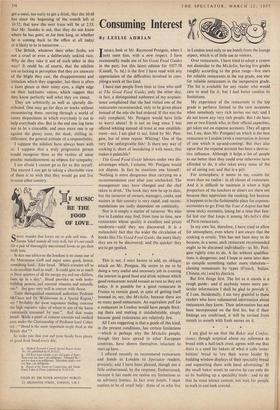The British Nihilists
By STRIX
THE other day I put through a transatlantic telephone call to my home in England from a place in New Brunswick.
`I'll call you back,' said the friendly, courteous voice of the Canadian girl on the exchange. Presently she did.
'I'm sorry, caller,' she said, 'but London says there's no such number as Scribblebury 304. Are you sure that's the number you want?'
I said I was quite sure; it was my own telephone number and had been for twenty years.
`OK,' said the girl cheerfully. 'We'll try again.'
London spoke in a lugubrious Cockney snarl. 'I've told you, miss, there's no such number.... No, the line's not out of order; it's simply that there's no such number. ... Directory Inquiries? They can't 'elp unless they 'ave the full name and address of the subscriber your caller wishes to be connected with.... Oh, very well.... 'Ow do you spell that?'
Tetchily, with an ill grace, London took down the particulars; and eventually came back to say that there was a subscriber called Strix on the Scribblebury exchange—Scribblebury 304.
'That's the number I asked for,' said the Canadian girl, still friendly, still courteous.
'Oh no it wasn't,' London retorted. 'You asked me for 344. Do you want this other number now?' 'Please.' A minute later I got my connection.
Throughout the colloquy of which I have given a much condensed summary the contrast between the two operators was so marked that it was diffi- cult to believe that they shared a common pur- pose, were collaborating in the same enterprise. The Canadian girl sounded throughout as if she actively wanted me to get my number; the Cockney sounded exactly the opposite. It was not merely that he didn't care a damn whether I got the number or not; he wanted the project, once he had proclaimed it impossible, to prove so.
In these islands we have become in recent years inured to this mild form of nihilism. 'Typical!' we exokim perfunctorily (and unfairly, for it is not typical and is, at a guess, getting rarer) when somebody tells us a hard-luck story of their treatment by a petty official, a shop assistant, a waitress, or some such. The burden of the vic- tim's lament is almost always the same; he or she has come up against a brick wall in which bad manners supply the mortar and of which the foundations are laid, not so much in a positive desire to obstruct or humiliate, as in a drab, in- stinctive denial of sympathy and co-operation.
The reason why the surliness—apart from the inefficiency—of my compatriot on the telephone exchange made at the time such a strong im- pression on me was because, after travelling for two or three weeks in Canada, I had got out of the habit of half-expecting that sort of thing. My itinerary had been complicated, its tempo urgent. It had bristled with small administrative anxieties. A preternaturally early breakfast, a suit pressed overnight, a railroad reservation altered at short notice, an air passage confirmed or reconfirmed, a suitcase brought from the checkroom to a rendezvous—each was in itself a trivial transaction.
Yet almost every day there had been some small, boring task which needed to be performed for me with alacrity by a stranger, and failure in which would have jeopardised my chances of getting from A to B, and on to C and D, in time. There was no failure, nor was there anything in the Canadian atmosphere to suggest that there might be one. I know nothing at all about Canada; but I have the impression that the people of that country are actively concerned to further any reasonable enterprise, whether it is supervising a truce in Indo-China or making sure that a traveller catches his train. They do not enjoy saying 'You've had it, chum'; they never say 'I couldn't care less,' I am against blaming things on wars; but I suspect that it was in the immediate aftermath of the last war that British nihilism first became a noticeable part of the national climate.
Nihilism ('negative doctrines, total rejection of current beliefs, in religion or morals': OED) is really too grandiose, too positive a word to de- scribe the attitude I have in mind. A flaccid unhelpfulness, an ulcerous satyagraha, a form of apathy which places upon small rules and regu- lations the same sort of reliance that a blowsy woman places upon corsets—these are among its unbecoming symptoms.
I often wonder where we got it from and why a minority of the population appears, in the dis- charge of its duties, to model its conduct on the less well-adjusted type of Bengali stationmaster. Whence comes that note of sour relish in the tones in which they tell us that it is too late to get a meal, too early to get a drink, that the 10.48 has since the beginning of the month left at 10.32-, that now the next train will be at 2.35, that Mr. Snooks is out, that they do not know- where he has gone, or for how long, or whether he is coming back to the office at all today or is likely to be in tomorrow....
The British, whatever their other faults, are not a cruel or even a deliberately unkind race.
Why do they take it out of each other in -this way? It could be, of course, that the nihilists are so lacking in perception that they are unaware of the blight they cast, the disappointment and irritation which they engender; but there is often a faint gleam in their stony eyes, a slight edge on their lacklustre voices, which suggest that they know perfectly well what they are about.
They are arbitrarily as well as sparsely dis- tributed. One may go for days or weeks without encountering them, moving through a world of sunny dispositions in which everybody is out to help everybody else. But in the end one log turns out to be a crocodile, and once more one is up against the glassy stare, the dank, chilling in- difference, the general attitude of a-responsibility. I suppose the nihilists have always been with us. 1 suppose that a truly progressive person would recognise them as the victims of some psychic maladjustment, as objects for sympathy. I am afraid I cannot go as far as this myself. The nearest I can get to taking a charitable view of them is to wish that they would go and live in some other country.



































 Previous page
Previous page